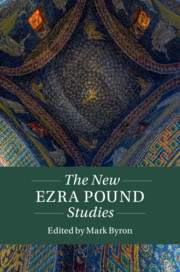Book contents
- The New Ezra Pound Studies
- Twenty-First-Century Critical Revisions
- The New Ezra Pound Studies
- Copyright page
- Contents
- Notes on Contributors
- Key to Abbreviations
- Editor’s Introduction
- Part I Pound’s Texts
- Part II Ezra Pound and Asia
- Part III Culture and Politics
- Chapter 11 The Transnational Turn
- Chapter 12 Pound, Gender, Sexuality
- Chapter 13 Italian Fascism
- Chapter 14 Late Cantos, ‘Aesopian Language’, States’ Rights and John Randolph of Roanoke
- Chapter 15 Copyright
- Chapter 16 The Temple and the Scaffolding
- Afterword
- Index
- References
Chapter 12 - Pound, Gender, Sexuality
from Part III - Culture and Politics
Published online by Cambridge University Press: 17 October 2019
- The New Ezra Pound Studies
- Twenty-First-Century Critical Revisions
- The New Ezra Pound Studies
- Copyright page
- Contents
- Notes on Contributors
- Key to Abbreviations
- Editor’s Introduction
- Part I Pound’s Texts
- Part II Ezra Pound and Asia
- Part III Culture and Politics
- Chapter 11 The Transnational Turn
- Chapter 12 Pound, Gender, Sexuality
- Chapter 13 Italian Fascism
- Chapter 14 Late Cantos, ‘Aesopian Language’, States’ Rights and John Randolph of Roanoke
- Chapter 15 Copyright
- Chapter 16 The Temple and the Scaffolding
- Afterword
- Index
- References
Summary
Most previous discussions of Ezra Pound, gender and sexuality have focused on Pound’s poetic depictions of women and his relationships with women artists, patrons and muses. The fascinating biographical stories include such figures as the poet H. D., perhaps Pound’s first love; the pianist and patron Margaret Cravens, who took her life after playing a song Pound and Walter Rummel wrote for her; Pound’s wife, Dorothy (Shakespear) Pound; and his long-time mistress, Olga Rudge, a concert violinist. When critics focus on sexuality and Pound, the result tends to be ‘paranoid’ rather than ‘reparative’ readings, to use Eve Sedgwick’s famous formulation.
Keywords
- Type
- Chapter
- Information
- The New Ezra Pound Studies , pp. 196 - 207Publisher: Cambridge University PressPrint publication year: 2019



